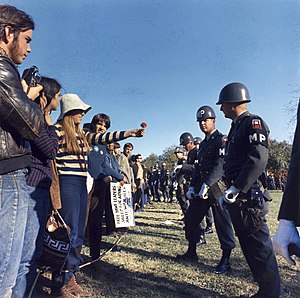Opposition to United States involvement in the Vietnam War
| Opposition to United States involvement in the Vietnam War | |
|---|---|
| Part of the Counterculture of the 1960s and Vietnam War | |
 Anti-war protest at the Pentagon, 1967 | |
| Date | 1964–1973 |
| Caused by | American involvement in Vietnam |
| Goals |
|
| Resulted in |
|
Opposition to United States involvement in the Vietnam War began with protests in 1964 against the role of the United States in the Vietnam War. It became a social movement over the several years. This movement caused and educated a debate, mainly in the United States, during the second half of the 1960s and early 1970s on how to end the war.
Many in the peace movement within the United States were children, mothers, or anti-establishment young people.
Their actions were mainly of peaceful, nonviolent events. In some cases, police used violent force against peaceful demonstrators. In 1970, four unarmed college students were killed by the Ohio National Guard, on the Kent State University campus. The incident's name is the Kent State shootings.[1][2][3])
By 1967, according to Gallup polls, an increasing majority of Americans thought that the military involvement in Vietnam to be a mistake.[4]
References[change | change source]
- ↑ Philip Caputo (May 4, 2005). "The Kent State Shootings, 35 Years Later". NPR. Archived from the original on May 16, 2020. Retrieved November 9, 2007.
- ↑ Rep. Tim Ryan (May 4, 2007). "Congressman Tim Ryan Gives Speech at 37th Commemoration of Kent State Massacre". Congressional website of Rep. Tim Ryan (D-Ohio). Archived from the original on July 25, 2007. Retrieved November 9, 2007.
- ↑ John Lang (May 4, 2000). "The day the Vietnam War came home". Scripps Howard News service. Archived from the original on February 11, 2010. Retrieved November 9, 2007.
- ↑ "Robert S. McNamara, Architect of a Futile War, Dies at 93". The New York Times. July 7, 2009.
